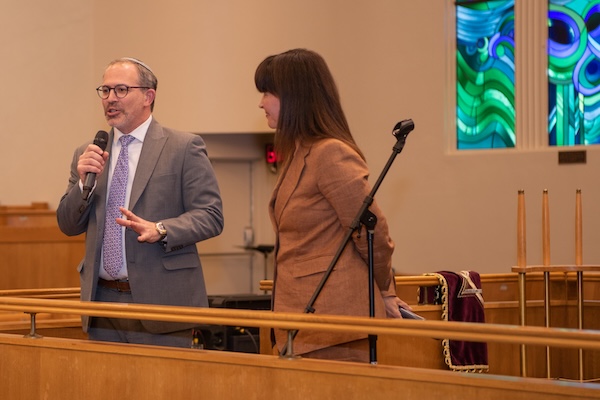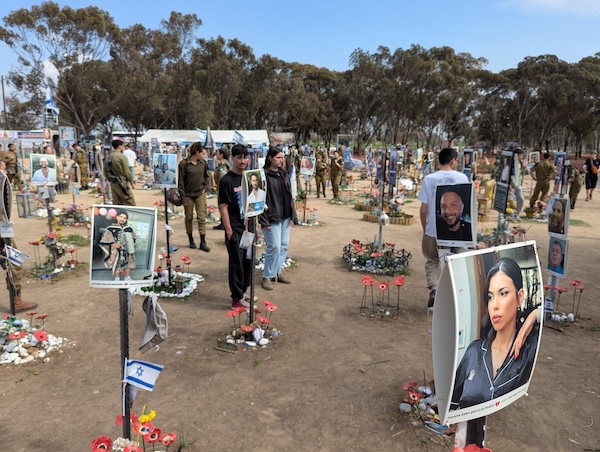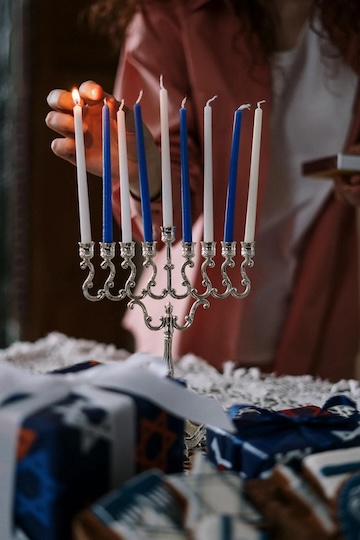Why do international media outlets seem intent on repeating the Hamas narrative? According to British military expert Maj. (ret.) Andrew Fox, there are a few key factors – including antisemitism.
“The first [factor] is a human desire not to admit when they are wrong and we don’t understand how powerful this is because it means that they have to admit that they have been wrong for the last 18 months,” he told JNS during a visit to Israel earlier this year.
Fox continued: “The second reason is the power of the narrative. Once you have achieved the dominance of your narrative, it is very, very difficult to present another narrative. The third one is antisemitism. While everything is not antisemitism – and I am really wary of saying that it is – certainly there are biases.”
Fox was a panelist at the International Conference on Combating Antisemitism hosted by the Ministry of Diaspora Affairs in Jerusalem on March 27. As a research fellow at the Henry Jackson Society who served as a top officer in the British army from 2005 to 2021, he is an authoritative voice supporting Israel, explaining how the Israel Defence Forces operates, and fighting disinformation about the Israeli military and its terrorist enemies.
In December 2024, Fox released a report under the auspices of the Henry Jackson Society titled “Questionable Counting: Analyzing the Death Toll from the Hamas-Run Ministry of Health in Gaza.” The report presented clear indications that Hamas was padding casualty numbers. Despite this, he said, many in the media repeated, without question, whatever Hamas put out.
Fox is not the only publisher of a report that backs Israeli data with empirical evidence. On March 18, he pointed out, British historian Lord Andrew Roberts presented the All-Party Parliamentary Group report on the atrocities of Oct. 7, 2023. The 318-page report lays bare the depravity of the Hamas attack in detail.
“The immediate reaction online is that it’s biased,” Fox said. “Lord Roberts is not Israeli, Israel is not his area of focus and everything is meticulously referenced. Yet, it has been utterly dismissed out of hand, and that is absolutely astonishing.”
He added: “Of course, there will be a strong counter campaign with Qatari money. I had the same thing with my report. The final aspect is that the Palestinian campaign has 10 times the supporters that Israel does. It’s a numbers game, ultimately.”
Is antisemitism in the form of anti-Zionism, or what some call “Israelophobia,” ingrained in some media institutions?
According to Fox, the answer is yes. “It is institutional with the BBC. Twice this year [as of March] they have had to put out major apologies breaching their own impartiality guidelines – when they platform Hamas royalty in a documentary about kids in Gaza or when they email the Israeli embassy asking for a speaker who is specifically anti-Netanyahu,” he said.
“There are three parts to an apology: ‘I am sorry, it’s my fault and I will do better.’ They haven’t really done that third part at all. It is endemic and institutionalized.”
While the IDF has faced criticism from journalists who are not being allowed into Gaza, with some saying this strategy has impaired Israel’s ability to present the facts on the ground, Fox backed the Israeli military’s position.
“If you give a journalist free rein in Gaza, they will either do what Hamas tells them or they will be killed – and that will be blamed on the IDF anyway. From a military perspective, you don’t want anyone filming an airstrike because they don’t have all the supporting data to report fairly without knowing what went into the targeting process.”
To illustrate his point, Fox said he had flown to Israel with Sir John McColl, a former British army four-star general who had been “very anti-IDF.”
“All week he was pushing the IDF like a hawk – and then came home and wrote an op-ed saying he was convinced Israel is doing everything it can to protect civilians, and that’s what the IDF should be showing journalists,” Fox said.
He added: “You can’t send journalists in with fighting troops; that is too dangerous. Fighting in Gaza is a 360-degree war. You have high-rise buildings, ground level, underground. As a soldier, I would probably refuse to take a journalist into that battle.”
Fox expressed concern that we are in a very dangerous information environment when many people turn to social media for information because of the 24-hour news cycle, and very often what is posted is not factual and has not been verified. In the rush to make the news cycle, journalists are also not fact-checking properly, he said.
“The fight against antisemitism is the most important thing to me,” he said. “The stories I hear from my friends are just shocking.”
When asked what communities around the world could be doing better, he said: “We are not going to stop 2,000 years of antisemitism; it is not something we can defeat. It is not easy, but I would work to bring the silent majority on to our side.”
He added: “From a British perspective, we need to make it about a community that is part of the country. The ‘Palestine’ marches are horrendous and very un-British. It’s about how we frame it.”
Rolene Marks is a journalist and commentator specializing in Israeli advocacy, global Jewish affairs and Middle Eastern politics for JNS.org. She is a member of Media Team Israel and Truth be Told, both dedicated to promoting accurate reporting on Israel. Additionally, she serves as the chair of WIZO’s hasbara division, where she leads efforts in public diplomacy and advocacy. This article was originally published on jns.org.
* * *
Marks’s two stops here

Israeli journalist, advocate, and chair of WIZO’s hasbara (communications) division Rolene Marks is touring Canada this September with Just the Facts, about the current situation in Israel, the realities of the war between Israel and Hamas (and other hostile groups), and the resilience of the Israeli people. Marks stops in Vancouver on Sept. 12 for an event hosted by CHW and the Ohel Ya’akov Community Kollel, and also helps open CHW Vancouver Centre’s new year, on Sept. 14.
At the Kollel young professionals event, Marks will talk about the United Nations, Gaza and Israel-related topics, and the Canadian government’s agenda, as it affects Israel and the Jewish diaspora. She will dispel lies, misinformation and blood libels, sharing links for where people can find accurate information and sources, stressing the need for Jews in Canada to share accurate information on social media. As well, she will discuss WIZO’s work in Israel and the importance of belonging to CHW (Canadian Hadassah-WIZO).
To join the CHW-Kollel Young Adults Shabbat experience on Sept. 12, 7:30 p.m., go to chw.ca/just-the-facts. Registration is by donation.
The CHW Vancouver Centre’s opening luncheon and fashion show on Sept. 14, 10:30 a.m., will feature fashions from After Five and Maison Labelle, lunch and door prizes, as well as an exclusive pre-event meet-and-greet for sponsors with Marks, CHW national president Tova Train and CHW chief executive officer Lisa Colt-Kotler. Tickets ($96) are available at chw.ca/region/western-region.
– Courtesy CHW






